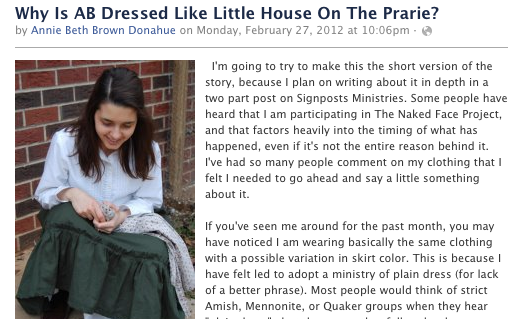I’m going to try to make this the short version of the story, because I plan on writing about it in depth on Signposts Ministries. Some people have heard that I am participating in The Naked Face Project, and that factors heavily into the timing of what has happened, even if it’s not the entire reason behind it. I’ve had so many people comment on my clothing that I felt I needed to go ahead and say a little something about it.
If you’ve seen me around for the past month, you may have noticed I am wearing basically the same clothing with a possible variation in skirt color. This is because I have felt led to adopt a ministry of plain dress (for lack of a better phrase). Most people would think of strict Amish, Mennonite, or Quaker groups when they hear “plain dress”- but there are other folks who do a “modern” version of plain and simple dress that does not adhere to a specific pattern or to specific clothing items. For me, it’s more like I hit the “unsubscribe” button on the fashion industry’s messages.
I really don’t want to go into too much detail because that might spoil my future posts. What I do want to do is briefly give the reasons behind switching over. For a long time I have felt called to to this but kept putting God off with an “it’s a cultural thing” or “people just don’t DO that” or “it would make me less relevant”. But, after examining my own life, I realized that those were just excuses. The only reason I could come up with for buying into mainstream First World fashion and clothing was if you were talented in this area and were able to bring glory to God through beautiful clothing in some manner. So I had to ask myself, for a person like me, who has no interest or gift in clothing, what role should it have in my life? Here’s what the Bible told me about clothes both specifically and non-specifically:
- Don’t worry about where it’s going to come from. God provides what you need.
- Don’t try to keep up with the latest fashions or be flashy, it’s not what life’s really about.
- Don’t exploit others. (This is relevant because most of us don’t know who made our clothing, how much they were paid, or if their work conditions were fair. They probably weren’t.)
- Don’t dress and act one way for one group of people and another way for another group of people.
So, I made the decision to stop keeping more clothes in my closet than most people in a 3rd World country will ever own in their lifetime. I chose 3 pleasant looking skirts and 3 shirts that could be made warmer or colder by adding or subtracting layers. They were mostly hand made by an adult who enjoys what she does and gets paid fairly for her work. She is a person I can talk to in real life and form a relationship with, thereby connecting me to the origins of the clothing, so I can value the work and skill that went into making them.
I also chose a pair of shoes made from all natural materials by an older lady in Minnesota that takes tracings of your feet and turns them into custom made shoes. Her shop has all of about 2 or 3 employees and she said it took her two years to really learn the trade. I chose a style that (while maybe a little quaint) is appropriate at home, at the doctors office, or at church. I am not going to dress differently for church because the clothes I have are modest and pleasant looking. They do not need to be flashier or more fashionable. God wants us to give him our best, but often church wear turns into people trying to “look good” to show status or cover up their own insecurities. Because I now only wear 3 outfits, I also wear an apron daily because I need to actually take care of and protect the things I have. I do less laundry because I keep things clean and wear them multiple times before washing.
What did I do with the rest of my clothes? Some of them I kept for special occasions. I’m not being legalistic about this. My mom gave me a nice dress for Christmas and I am keeping it to wear to an event that’s out of the ordinary. I also kept some other clothes for doing things like painting or going to the chiropractor. But the clothes I have were selected carefully for a specific purpose and will be valued.
The rest of my clothes I bagged up and sent to Peru. Because that shirt I wore once last year may now become an everyday item for someone less financially fortunate than me.
Do I think everyone should do something as extreme as this? No. Your job or lifestyle may not make that possible. What I do hope is that people are challenged by it. And I hope people will check out my upcoming posts on SpM and see how this all ties in to disability and how the world decides how to assign value to people. No matter where you fall on the “fashion” spectrum, if you live in America, you could probably do a little considering of “wants” verses “needs”.



Trackbacks/Pingbacks